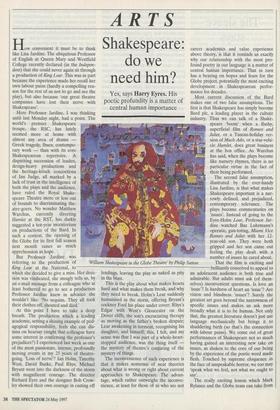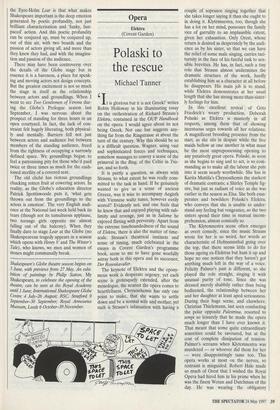ARTS
Shakespeare: do we need him?
Yes, says Harry Eyres. His poetic profundity is a matter of central human importance
How convenient it must be to think like Lisa Jardine. The ubiquitous Professor of English at Queen Mary and Westfield College recently declared (in the Indepen- dent) that she could never again sit through a production of King Lear. This was in part because the experience made her recall her own labour pains (hardly a compelling rea- son for the rest of us not to go and see the play), but also because 'our great theatre companies have lost their nerve with Shakespeare'.
Here Professor Jardine, I was thinking until last Monday night, had a point. The world's premier Shakespeare troupe, the RSC, has lately seemed more at home with almost any area of drama — Greek tragedy, Ibsen, contempo- rary work — than with its core Shakespearean repertoire. A dispiriting succession of leaden, design-heavy productions and the heritage-kitsch concoctions of Ian Judge, all marked by a lack of trust in the intelligence of both the plays and the audience, have ruled the Royal Shake- speare Theatre more or less out of bounds to discriminating the- atre-goers. No wonder Matthew Warchus, currently directing Hamlet at the RST, has darkly suggested a ten-year moratorium on productions of the Bard. In such a context, the opening of the Globe for its first full season next month raises as much apprehension as hope.
But Professor Jardine was referring to the production of King Leaf at the National, to which she decided to give a miss. Her deci- sion was vindicated, she smugly tells us, by an e-mail message from a colleague who at least bothered to go to see a production Professor Jardine knew in advance she wouldn't like: 'No sequins. They all took their clothes off, shouted and died.'
At this point I have to take a deep breath. The production which a leading academic, setting a shining example of ped- agogical responsibility, feels she can dis- miss on hearsay (might that colleague have some interest in confirming the professor's prejudices?) I experienced last week as one of the most passionate, intense, profoundly moving events in my 25 years of theatre- going. 'Loss of nerve'? Ian Holm, Timothy West, David Burke, Paul Rhys, Michael Bryant went into the darkness of the storm with magnificent courage. The director Richard Eyre and the designer Bob Crow- ley showed their own courage in casting off 'William Shakespeare in the Globe Theatre' by Philip Sutton lendings, leaving the play as naked as pity in the blast.
This is the play about what makes hearts hard and what makes them break, and why they need to break. Holm's Lear suddenly humanised in the storm, offering Bryant's cockney Fool his place under cover; Rhys's Edgar with West's Gloucester on the Dover cliffs, the son's excruciating therapy as moving as the father's broken despair; Lear awakening in torment, recognising his daughter, and himself; this, I felt, and my sense was that I was part of a whole-heart- stopped audience, was the thing itself — the mystery of theatre's conjuring of the mystery of things.
The inconvenience of such experience is that it makes nonsense of neat theories about what is wrong or right about current approaches to Shakespeare. The advan- tage, which rather outweighs the inconve- nience, at least for those of us who are not career academics and value experience above theory, is that it reminds us exactly why our relationship with the most pro- found poetry in our language is a matter of central huinan importance. That in turn has a bearing on hopes and fears for the Globe project, potentially the most exciting development in Shakespearean perfor- mance for decades.
Most current discussion of the Bard makes one of two false assumptions. The first is that Shakespeare has simply become Bard plc, a leading player in the culture industry. Thus we can talk of a Shake- speare 'boom' when a flashy, I superficial film of Romeo and Juliet, or a Tuscan-holiday ver- sion of Much Ado, or a star-vehi- cle Hamlet, does great business at the box office. As Warchus has said, when the plays become like nursery rhymes, there is no particular virtue in the fact of their being performed.
The second false assumption, illustrated by the ever-handy Lisa Jardine, is that what makes Shakespeare important is a nar- rowly defined, and prejudiced, contemporary relevance. The plays become commentaries on 'issues'. Instead of going to the Eyre-Holm Lear, Professor Jar- dine watched Baz Luhrmann's operatic, gun-toting, Miami Vice Romeo and Juliet with her 12- year-old son. They were both gripped and her son came out feeling the play dealt with a number of issues he cared about.
That the film is exciting and brilliantly conceived to appeal to an adolescent audience is both true and admirable. But adults must ask (of them- selves) inconvenient questions. Is love an 'issue'? Is hardness of heart an 'issue'? Are vision and blindness 'issues'? Surely the greatest art goes beyond the narrowness of specific issues and makes us ask more broadly what it is to be human. Not only that, the greatest literature doesn't just use language mechanically but brings it to shuddering birth (so that's the connection with labour pains). We come out of great performances of Shakespeare not so much having gained an interesting new take on issues, as shaken to the core of our being by the experience of the poetic word made flesh. Touched by supreme eloquence in the face of unspeakable horror, we too may 'speak what we feel, not what we ought to say'.
The really exciting lesson which Mark Rylance and the Globe team can take from the Eyre-Holm Lear is that what makes Shakespeare important is the deep emotion generated by poetic profundity, not just brilliant characterisation and `funky, fast- paced' action. And this poetic profundity can be conjured up, must be conjured up, out of thin air, with two boards and the passion of actors giving all, and more than they knew they had, and with the imagina- tion and passion of the audience.
There may have been controversy over the details of the Globe stage but in essence it is a bareness, a place for speak- ing and moving actors not design concepts. But the greatest excitement is not so much the stage in itself as the relationship between actors and groundlings. When I went to see Two Gentlemen of Verona dur- ing the Globe's Prologue season last September, I was nervous about the prospect of standing for three hours in an open courtyard. In fact, the lack of con- straint felt hugely liberating, both physical- ly and mentally. Barriers fell not just between actors and audience but between members of the standing audience, freed from the tightness of occupying a narrowly defined space. We groundlings began to feel a patronising pity for those who'd paid twice or three times as much for the cush- ioned sterility of a covered seat.
The old cliché has riotous groundlings chucking rotten fruit at cowering actors. In reality, as the Globe's education director Patrick Spottiswoode puts it, 'what gets thrown out from the groundlings to the actors is emotion'. The very English audi- ence at the National last week held back its tears (though not its tumultuous applause, two teenage girls opposite me almost falling out of the balcony). When they finally dare to stage Lear at the Globe (no Shakespearean tragedy appears in a season which opens with Henry V and The Winter's Tale), who knows, we men and women of stones might communally break.
Shakespeare's Globe theatre season begins on 5 June, with previews from 27 May. An exhi- bition of paintings by Philip Sutton, My Shakespeare, to celebrate the opening of the theatre, can be seen at the Royal Academy until I June; International Shakespeare Globe Centre 4 July-26 August; RSC, Stratford 9 September-30 September; Royal Armouries Museum, Leeds 6 October-30 November.



























































 Previous page
Previous page